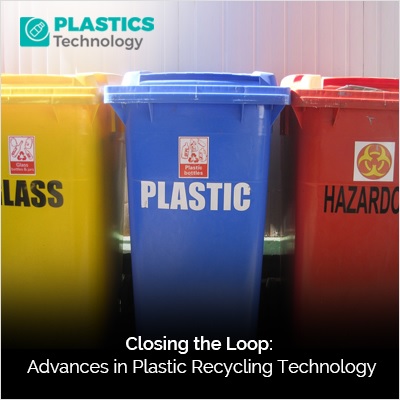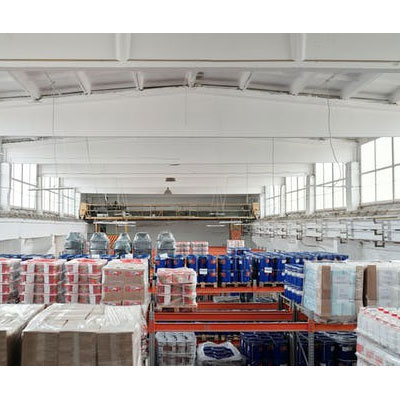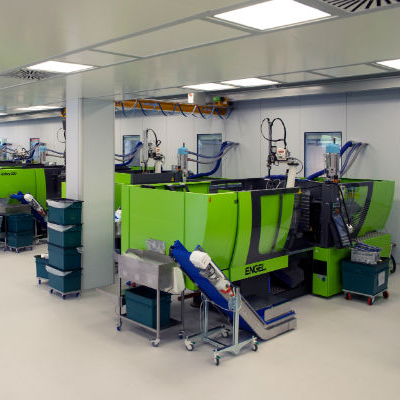Articles
Closing the Loop: Advances in Plastic Recycling Technology

Every day, millions of tons of plastic waste is generated around the world, causing significant environmental and health issues. However, there is hope on the horizon as advances in plastic recycling technology are closing the loop and transforming the way we deal with plastic waste. This article explores the latest innovations in plastic recycling and highlights the promising developments that are contributing to a more sustainable future.
The Importance of Closing the Loop in Plastic Recycling
Plastic waste has become a global crisis, polluting our oceans, harming wildlife, and affecting human health. Traditional recycling methods have proven to be insufficient in dealing with the sheer volume of plastic waste generated. However, advancements in plastic recycling technology are offering a solution to this ever-growing problem.
Closing the loop in plastic recycling refers to the process of transforming plastic waste back into valuable resources, thereby reducing the need for virgin materials and minimizing waste. By adopting advanced recycling technologies, we can create a circular economy for plastics, where plastic waste is continuously recycled and repurposed, reducing our reliance on fossil fuels and conserving resources.
Challenges in Traditional Plastic Recycling Methods
Traditional plastic recycling methods have faced several challenges that hinder their effectiveness. One of the major issues is the difficulty in sorting and separating different types of plastics. Plastics come in various forms, each with its own chemical composition and physical properties. Sorting them manually is time-consuming and often prone to errors. This leads to a lower quality of recycled plastics, limiting their usability and market demand.
Another challenge lies in the recycling of hard-to-process plastics, such as multi-layered packaging and mixed plastics. These materials are often not accepted by traditional recycling facilities due to their complex structure. As a result, they end up in landfills or incinerators, contributing to environmental pollution.
Advances in Plastic Recycling Technology
Thankfully, advances in plastic recycling technology are revolutionizing the way we handle plastic waste. These innovations are enabling more efficient sorting, improving the quality of recycled plastics, and expanding the range of plastics that can be recycled.
Mechanical Recycling: How It Works and Its Limitations
Mechanical recycling is the most common method used to recycle plastic waste. It involves shredding and washing plastic waste to remove impurities, followed by melting and reprocessing the shredded plastic into new products. This process has been enhanced with the development of improved shredding and washing technologies, resulting in higher recycling rates and better quality recycled plastics.
However, mechanical recycling has its limitations. It is not suitable for all types of plastics, especially those that have been contaminated or degraded. Additionally, the quality of recycled plastics deteriorates with each recycling cycle, limiting their potential for repeated use. To overcome these limitations, new recycling techniques have emerged.
Chemical Recycling: A Breakthrough in Plastic Recycling
Chemical recycling, also known as feedstock recycling, is an innovative approach that tackles the challenges associated with hard-to-recycle plastics. This method involves breaking down plastic waste into its molecular building blocks, which can then be used as feedstock for the production of new plastics or other valuable products.
One of the key advantages of chemical recycling is its ability to process a wider range of plastics, including multi-layered packaging and mixed plastics. This technology has the potential to significantly increase the recycling rates of these challenging materials, reducing their environmental impact.
Biodegradable Plastics: The Future of Sustainable Packaging
In addition to advanced recycling technologies, the development of biodegradable plastics is another promising advancement in the quest for sustainable packaging solutions. Biodegradable plastics are designed to break down naturally in the environment, reducing their persistence and potential harm to ecosystems.
These innovative materials offer an alternative to traditional plastics, especially for single-use items. However, it is important to note that biodegradable plastics require proper composting conditions to degrade effectively. Without adequate composting facilities, they may not provide the intended environmental benefits.
Innovations in Plastic Waste Management
Alongside technological advancements, innovative approaches to plastic waste management are emerging. These approaches aim to reduce plastic waste at its source, promote reuse and recycling, and educate consumers about sustainable choices.
One such innovation is the concept of extended producer responsibility (EPR), where manufacturers are held accountable for the entire lifecycle of their products, including their disposal. EPR programs encourage producers to design products that are easier to recycle and promote the establishment of collection and recycling infrastructure.
Furthermore, initiatives such as plastic waste collection drives, awareness campaigns, and community recycling programs are fostering a culture of responsible plastic waste management. By engaging individuals, businesses, and governments, these initiatives contribute to a more sustainable future.
The Role of Government and Industry in Advancing Plastic Recycling Technology
The development and widespread adoption of advanced plastic recycling technologies require collaboration between governments, industries, and research institutions. Governments play a crucial role in creating supportive policies and regulations that encourage investment in recycling infrastructure, promote innovation, and incentivize the use of recycled materials.
Industry leaders are also taking proactive steps towards sustainable practices. Many companies are incorporating recycled plastics into their products, embracing circular economy principles, and investing in research and development to improve recycling technologies.
The Economic and Environmental Benefits of Closing the Loop
Closing the loop in plastic recycling offers significant economic and environmental benefits. By recycling plastic waste, we reduce the demand for virgin materials, saving energy and reducing greenhouse gas emissions associated with plastic production. Recycling also creates job opportunities in the recycling industry and reduces the costs of waste management.
Furthermore, by preventing plastic waste from entering landfills or ending up in the environment, we protect ecosystems, conserve natural resources, and mitigate the negative impacts of plastic pollution on wildlife and human health.
Conclusion: The Path towards a Circular Plastics Economy
Advances in plastic recycling technology are bringing us closer to a circular plastics economy, where plastic waste is no longer seen as a problem but as a valuable resource. By embracing advanced sorting technologies, chemical recycling processes, and biodegradable plastics, we can close the loop in plastic recycling and pave the way for a more sustainable future.
However, achieving a circular plastics economy requires collective action. Governments, industries, and individuals must work together to invest in recycling infrastructure, support research and innovation, promote responsible consumption and waste management practices, and raise awareness about the importance of closing the loop.
Together, we can turn the tide on plastic waste, protect our planet, and create a more sustainable and resilient future for generations to come.




